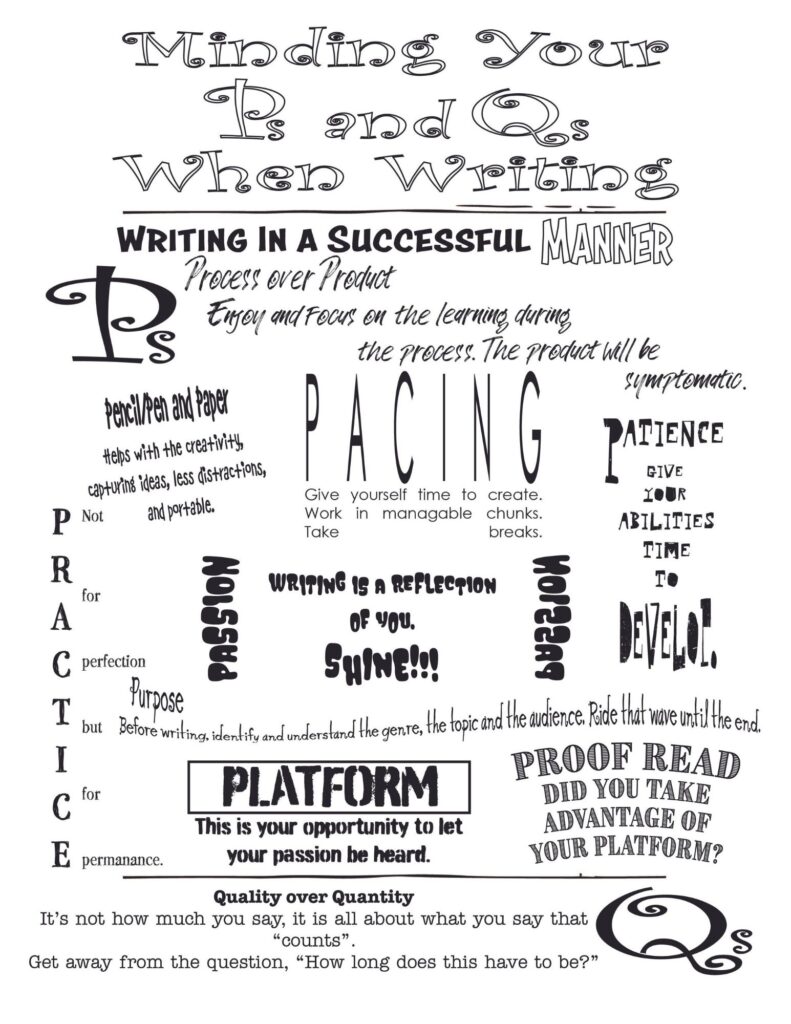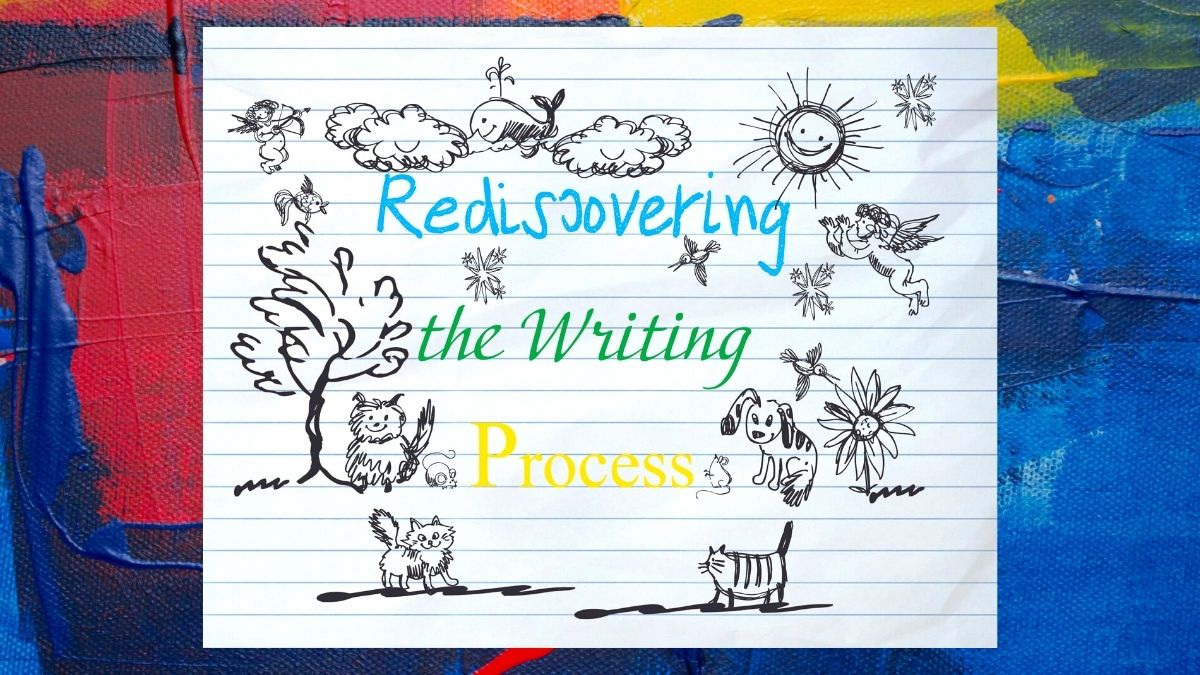Writing In a Successful Manner
There are a few academic subjects that consistently challenge many of our kids today. Removing the disinterest factor (Science, History, Music, and Art), what’s left are the dreaded Mathematics and Writing classes, assessments, assignments and homework. I have addressed Mathematics in the past and it came down to rethinking conceptually, addressing our mindset, understanding critical thinking and problem solving, and learning and using metacognition (see links below). Like Math, Writing difficulties can be traced back to a “fixed mindset”. This can be mitigated by Rediscovering the Writing Process.

Both subject are so challenging with many because they both can have a lengthy process. Kids will endure this lengthy process, turn it in, to only have to do it again for corrections. There is nothing more disheartening. After weeks, semesters, and years of this, frustration sets in. A dislike for both soon follows. Lastly, a fixed mindset that they cannot do it.
The good thing is that a fixed mindset can be reversed. Unfortunately, our kids feel the pressure of getting the right answer or producing a polished finished product.
Growth Mindset
A fixed mindset tells us that something is to hard too even try. Or even if we try, we’ll still never understand how it works or how to do it. With a Growth Mindset, you see the difficulties and you may have met failure. Yet, you seek the means to achieve success or at the very least, an understanding. Read more about Growth Mindset

Someone with a Growth Mindset has more than a “Glass Half Full” perspective. He or she also has an applicative will for progression. The word “failure” is not an end point, rather a learning opportunity. People with Growth Mindsets love challenges and the effort that they put into these challenges eventually leads them to growth and success. Self pride is also not a factor with their forward progressions. They actively seek out feedback and learn from the experiences of other. With a Growth Mindset, these individuals will either achieve or gain priceless knowledge on a challenge that was new. Priceless because knowledge is transferrable. Either way, both paths are successful.
Imagine what we can do with this path of thinking through challenges or new experiences. It is clear to say that there are many benefits to having a Growth Mindset. Most prominent is the loss of negativity. The idea that you do not have the skills or character to accomplish something. With a fixed mindset, giving up is a common and comfortable decision.
So how can we take this and help our kids become more comfortable or even excel with writing? We have to get them thinking about their manners when writing. We have to give them an opportunity to Rediscover the Writing Process.

Minding Your Ps and Q’s
We mind our manners in social settings not only out of respect for those around us but also for respect to ourselves. The same concept should go for writing. We should write with the utmost respect for our audience. At the same time, understanding that what we write, will be a reflection of us as a writer in addition to our thoughts and ideas. Minding our Ps and Qs (minding our manners) while writing can help us rediscover the writing process.
Process Over Product
A Growth Mindset is key for the first set of Ps. Writers have to have the ability to embrace the process of writing. During the process of writing there is so much discovery and learning available to any writer seeking to grow in writing, academics, and personal knowledge.
Focusing on the process over the product will utilize and develop every P listed below. As mentioned above, our kids (actually the majority of the human population) have so much focus on final products and want a quick path to achieve it. Unfortunately, it’s learned through the conveniences of today. The internet gives us information, videos, images with a simple click. Don’t blame current times though, because we can go back to the development and spread of “convenience” stores, ATM machines and microwave ovens. Many thing have been created or invented to save us time. For the most part, for tasks that we had no problems completing, without the advancement.
When we are so focused on the completion of that task or product, we are left to enjoy that one achievement. When focusing on the process, there is a treasury of achievements that we can shamelessly bathe in.
During the process of writing, victories are innumerable. There is vocabulary and spelling development. Discovery and growth with different sentence structures. Writers can reach new heights with imagery and descriptive writing. Learning new writing styles, genres and topics that are always revolving. Also, when generating supporting ideas, we learn so much about spiders, different animals, countries, history, science, people and cultures. Everything that we learn during the writing process is transferrable to other academic subjects or general life learning.

Teach your young writers (and maybe ourselves) how to slow down and enjoy the journey. There is too much knowledge and skill acquisition and development to go unnoticed and untouched through any process.
Patience
Like with anything, the knowledge and skills that are needed when writing develop over time. Allow time for this to happen. Patience is key. Every level, from novice to experienced writers, should show patience with their development and craft. Teach your writers to view every writing opportunity as a learning experience, or practice session.
You can then make it awkward by telling them that they were not created the day that they were born. Their beautiful selves took nine, long magical months.
Practice
Doing anything well, takes practice. This includes writing. We cannot let our kids determine what type of writer they are through a small sample size. They have to count every piece of writing, whether it is an assignment or a journal entry, as practice. So yes, we practice writing by writing.

If anyone has ever told you that “Practice makes perfect”? Don’t believe them. Rather, you should believe that “Practice makes permanence”. The more that we write, the more that we will become inclined to the different elements of writing. Multiple opportunities for experience allows those new skills to emerge and develop.
Encourage your kids to just simply write. They should write daily reflections or journal entries, where correct spelling conventions or grammar are not an area of focus. They can also be in charge of writing out the grocery lists. Have them start a pen pal or hand deliver letters to relatives, neighbors and friends. When our kids were toddlers, they always had whiteboards, pad of paper or Boogie Boards to write down words that the see during drives.
Try spending time writing with your kids as well. Not only will you be modeling the act of writing, you can also model the thinking when writing.
The Link Between Reading and Writing
Speaking of models, reading is actually a very good way to indirectly practice writing. Reading inspires readers to write. Books will expose children to a variety of words that they can use to expand their vocabulary and improve spelling. Point out certain words in their books and start a conversation about those words. The more ways a word is used (speaking, reading, writing, defining, illustrating, etc.) the likeliness of that word become part of their vocabulary.
Books also model many different types of sentence structures, grammar usage, and imagery. Having kids rewrite simple, compound and complex sentences, from books, is a great way to explore different sentence structures.
Pen/Pencil and Paper
Even though we are living in a digital age, it is good practice for kids to explore their writing through the “old fashion” means of pencil or pen and paper. Let’s face it, there are less distractions. As I wrote this up, I checked emails, read news feeds, did some research to only end up watching New Rockstar videos on YouTube.
Writing on paper is great because you can actively brainstorm and endlessly jot down, cross out, highlight and expand on ideas. Using paper also allows us to not be limited to writing. Ideas can emerge as illustrations. Ideas can also be organized with the use of webs, arrows, charts, etc. Best of all, a notebook dedicated to ideas can be carried around just about anywhere.

Get this habit of putting thoughts and ideas on paper instilled in our young writers. The more that gets brainstormed on paper, the likeliness of an interest or better understanding of the topic. There is nothing more dreadful, for our young writers, to go into a written assignment without an interest or an internal motivation.
Passion

An interest or internal motivation invokes emotions. Emotions translate into passion when writing. When we write without passion, it is more of a task. A task that we may resent, but complete just to get it over with or not complete it at all. If completed without passion, the quality of the writing will be compromised. Thinking about our kids, who struggle with writing, how much are they going to want to revise this assignment after getting corrected. Without passion, that is the last thing that they are going to want to do.
Teaching our young writers to write with a passion means that we are removing the idea that writing is a “task”. More so, we are getting them to write with enthusiasm, excitement and joy. The passion will be a sign of your “voice”. This is where vocabulary, emotions, and tone all come together in beautifully flowing sentences. We all have something to say and writing is a great way to communicate our thoughts. With passion, we go from “task” to “purpose”.
Purpose
Not only does writing give a writer the purpose of communicating passion, there is also a singular focus that written work aims to bring an understanding for the reader. Let’s face it, writing is a form of communication. There is nothing worse than bringing up an interesting conversation, with others, only for it to go in many different directions. Writing is not like that. It is up to the writer to keep the communication on a focused path.
To maintain this focus, writers always have to understand the topic, the genre, and the potential audience. Once understood, then all ideas, written statements and paragraphs should be written to fit that focus.
Platform
Again, written work is the writer’s time to be heard. Writers should enjoy and take favor to this platform. Take advantage of the opportunity to let your passion and purpose shine.

Pacing
Getting to that platform takes time. Remember, we write to be heard. Our writing is backed by a passion and a purpose. In order to convey it in a manner that can be understood, we have to take our time to do it. Remember, if quality becomes compromised without passion, we don’t want to let our passion go to waste be rushing through the writing process. As you would think, this also compromises the quality of the finished product.
Rather than producing a product all at once, schedule it out in manageable chunks. If it is due in a week, dedicate each day to a task. For example:
Monday – Brainstorm ideas and create a focus. Tuesday – Review focus and draft an Introductory paragraph. Wednesday – Review Introductory paragraph and start drafting supporting statements or paragraphs. Thursday – Review and edit supporting statements or paragraph. Friday – Review supporting statements or paragraph and draft a Concluding statement or paragraph. Saturday – Review draft and make necessary changes. Ask others to proof read and provide feedback. Sunday – Review feedback and make necessary changes.
The key is to find a schedule that works for the readiness level of your little writer. Doing it all at once, leads to frustration and a fixed mindset.
Proof Read
For struggling writers with a fixed mindset, proofreading is never fun. In their mind , they’re thinking, “Now I have to read what I wrote and fix errors?” Two minutes later, they’re done.
When the passion, the purpose and the gratitude for the platform are strong, the need to proof read follows suit. Proof reading is an opportunity for writers to make sure that what they want heard, will be heard. Proof reading can assess if sentence flow, grammar, or spelling are deterring readers from the writer’s passion, purpose or message.

Writers can take proof reading to the next level and ask others to proof read it as well. I would recommend a variety of readers, writers, ages, etc. to proof read, just to get multiple sources of feedback. Just be sure to ask those that are 100% willing to read and provide their honest, constructive feedback.
Good or bad, writers need to view feedback as constructive criticism that will help them with their current assignment, and for future ones. Learning never ends and can come from many sources. So much can be learned from the feedback of others.
Quality Over Quantity

It did not matter what grade I was teaching, it was inevitable for a student to ask how long written assignments had to be, seconds after being assigned. Young writers have to get away from the anxieties of writing according to a specific length. If they are to concerned with quantity, the quality becomes compromised. Thoughts either become repetitive or off topic. For many struggling writers, just knowing how much that they have to write automatically puts them in a position to fail. By rediscovering the writing process, writing will tend to naturally reach specified word counts (sometimes even more).
Rediscovering the Writing Process
I once heard a Pastor say that devotion does not start off as a devotion, it starts as a discipline. When we do something backed with discipline, we understand the importance or reason and purpose. When we start feeling the fruits of our labor, which may take time and plenty of learning, the passion begins to set in and you become devoted to what you are doing. You are so devoted that you begin to seek out like minded individuals or those with similar experiences. From them, we are able to assess our devotion and discover ways to grow even more. Writing fits right into this path. Comfort and confidence with writing begins with rediscovering the writing process.
Click HERE for Your Printable Copy

The Lord says, “I will guide you along the best pathway for your life. I will advise you and watch over you. – Psalm 32:8
